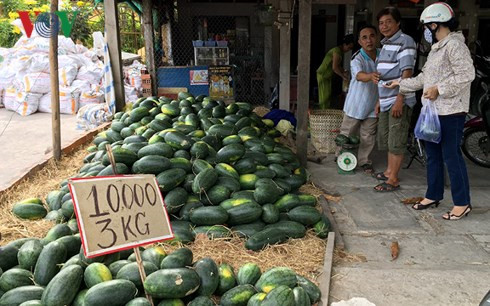[ad_1]
The US-China trade war will force agricultural products from the world’s two most powerful economies to seek new markets which could lead to a flood of cheap products coming into Vietnam, putting considerable pressure on domestic farm produce.
The growth of the agricultural sector hit a 10 year high during the first half of this year. However, export markets have seen unstable developments from the impact of the US-China trade war, the European Commission (EC)’s extension of a yellow card warning on Vietnamese seafood, unpredictable weather and natural disasters are existing difficulties facing the sector in late months of the year.
Domestic market faces intense competition as tariffs hit

China and the US are the two major export markets for Vietnam’s agricultural products. The tit-for-tat US-China trade war has created dramatic shifts in the import and export policies of the two powerful economies and this will have a knock-on effect on Vietnamese farm produce.
Agricultural products from China will have to find alternative markets to make up for the loss of trade resulting from the US’ increase of import duties on Chinese goods. With their plentiful supply, cheap prices and attractive varieties, Chinese fruit and vegetables will continue to compete fiercely with Vietnamese products.
In response to the US tariff hikes, China also raised import duties to 25% on the US’s farm produce such as fruit and meat including pork, beef, chicken and duck. The subsequent stockpile of these products are likely to enter the Vietnamese market.
According to statistics from the General Department of Vietnam Customs, the US was the biggest supplier of meat for Vietnam, shipping nearly 11,000 tons valued at more than US$13 million and accounting for a 37% market share in May, up nearly 50% in volume compared to April.
The economist, Ngo Tri Long, said that the imposition of ever more tariff polices will also act as a barrier to Vietnamese agricultural products entering the US and China.
China is the biggest consumer of most Vietnamese products like fruit, rice and seafood. The trade war will stem the tide of Chinese exports flowing to the US, forcing the country to adjust its policies to reduce its imports from other countries like Vietnam, which will influence domestic farm produce, said Mr Long.
As a result, both the domestic and export markets will have to deal with stiffer competition as the US and China will use their economic muscle in seeking new export markets for their agricultural products. Furthermore, their import demands may see a decline in the later months of this year.
Vietnam’s fruit and vegetable exports hit US$2 billion during the first half of this year but 75% of these products were bought by China. Overdependence on trade with one country will have many negative impacts when that market experiences fluctuations. This promises to be a big challenge to Vietnamese farm produce.
Traceable origins pose problem for fishing industry
In addition to the impacts of the US-China trade war, the EC working delegation raised the issues that Vietnam must continue to actively address, such as controlling fishing and tracing the origins of exploited seafood. The certification of the origins of seafood remains an obstacle as localities have not taken the reins to direct functional units in implementing the basic necessary measures.
us-china trade war puts pressure on vietnamese agricultural products hinh 1 Of the 33,000 fishing vessels in operation, only 3,000 have installed the require GPS tracking equipment. This leaves the vast majority of fishing boats unable to accurately track their positions or report catch locations.
In Vietnam, fishing is still seen as a traditional livelihood with many old customs, therefore it is very difficult to enforce regulations on tracing seafood origins.
Deputy Minister of Agriculture and Rural Development Vu Van Tam said the EC’s extension of the yellow card warning provides more time for the fisheries sector to finalize EC proposals and take efforts to adopt a model of responsible fishing.
The Directorate of Fisheries and the International Cooperation Department invited EC experts to observe the process of controlling and tracing certification origins and identifying the origin of seafood, allowing them to observe the real-life scenarios so that they can make appropriate proposals, said Mr Tam.
The Directorate of Fisheries will submit a draft decree on sanctioning administrative violations to the EC in mid-July. The draft proposes supplemental penalties such as the confiscation of vessels and operation licenses. This is part of Vietnam’s efforts to secure the removal of the EC yellow card warning on seafood.
VOV
[ad_2]
Source link
